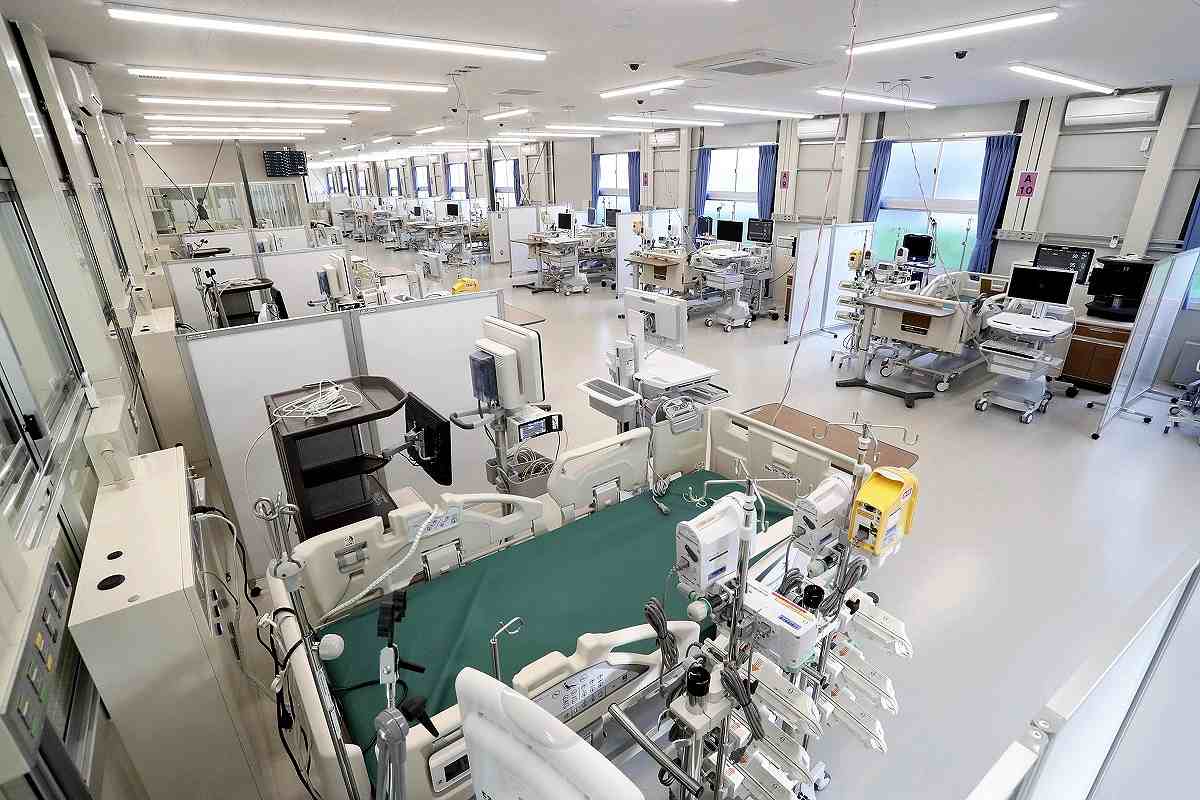
A temporary medical facility for seriously ill patients infected with the novel coronavirus is seen in Sumiyoshi Ward, Osaka, on Dec. 7.
16:21 JST, January 9, 2021
A shortage of hospital beds for COVID-19 patients in metropolitan areas has become particularly serious amid the latest surge in novel coronavirus infections.
However, the number of infection cases in Japan has been significantly lower than in Western countries, and Japan has the highest number of hospital beds per capita in the world.
To make effective use of the facilities and human resources, the nation needs to rebuild its medical system urgently.
■ ‘On the brink of collapse’
“The medical fields are now in the same state as a dam that is on the verge of bursting,” said Tamotsu Miki, director of Tokyo Medical University Hospital in Shinjuku Ward, Tokyo.
The hospital has secured six beds for seriously ill patients infected with the virus and 20 beds for patients with moderate symptoms, but the beds have been fully occupied since the beginning of this year. The hospital has had no choice but to refuse to accept COVID-19 patients at times.
In Tokyo, where the spread of the virus continues unabated, the cumulative number of infected people who could not find a hospital for treatment or a place for recuperation during the weeklong New Year’s holiday period topped 3,000. The occupancy rate of hospital beds secured by prefectural governments for COVID-19 patients has been on the rise especially in metropolitan areas.
However, Japan has significantly more hospital beds than any other member state of the Organization for Economic Cooperation and Development, per 1,000 people. Also, regarding beds in intensive care units (ICUs) or for other acute care, the number of such beds per 100,000 people is 13.5 in Japan, while the figures are 11.6 in France and 6.6 in Britain. In terms of daily infection numbers, Japan’s figures are also far lower than in the United States, which has seen more than 200,000 cases a day, and Britain, which has reported as many as about 60,000 daily cases.
■ Private hospitals cautious
Nevertheless, Japan is facing a growing shortage of hospital beds. Circumstances unique to the nation have created a situation in which virus patients have flocked to certain large hospitals. As of Wednesday, the number of hospital beds secured by prefectural governments for COVID-19 patients totaled 27,650, which is only 4% of the total number of acute care beds — about 730,000 — for patients undergoing surgery or in emergency care.
One of the factors behind this is that 70% of Japanese hospitals are run privately, a higher percentage than in any European country. Private hospitals in Japan have been cautious about accepting coronavirus patients, fearing possible outbreaks of clusters within the hospitals and the negative impact of harmful rumors on their businesses. According to a survey conducted by the Health, Labor and Welfare Ministry, 70-80% of public hospitals said they could accept COVID-19 patients, while only 18% of private hospitals said they could do so.
In addition, small and midsize hospitals with less than 200 beds account for 70% of all hospitals in Japan. A survey by Global Health Consulting Japan showed that the fewer beds a hospital had, the fewer patients it accepted. In the survey, only 20% of the hospitals with less than 100 beds said they had accepted COVID-19 patients, while 96% of the hospitals with more than 500 beds said they had accepted such patients.
The large number of hospitals is another problem, as it means doctors, nurses and other medical staff are dispersed. It is no easy task especially for small and midsize hospitals with lower staff numbers to accept coronavirus patients who require more manpower for treatment.
“The coronavirus pandemic has highlighted weaknesses in Japan’s medical system,” said Hiroya Ogata, a professor emeritus of Kyushu University who specializes in health care administration. “In the future, hospitals will need to concentrate their human resources through restructuring and integration.”
■ Govts take initiative in Europe
European countries are struggling to curb the spread of the virus, but as they have many large public hospitals, it is relatively easy for their governments to manage hospital bed occupancy.
Last spring, Germany increased the number of ICU beds by more than 10,000 at the initiative of its government. In Sweden, its government also has taken the lead in boosting the number of ICU beds and coordinating efforts regarding the hospitalization of COVID-19 patients.
“It would be effective for the central government to designate key hospitals to treat coronavirus patients and concentrate medical personnel there from other facilities, as has been done in Osaka,” suggested Shinya Matsuda, a professor at the University of Occupational and Environmental Health and an expert on medical systems.
“Rather than waiting for instructions from the central government, prefectural governments should exercise leadership while consulting with relevant parties,” Matsuda said.
Top Articles in Society
-

Man Infected with Measles May Have Come in Contact with Many People in Tokyo, Went to Store, Restaurant Around When Symptoms Emerged
-

Woman with Measles Visited Hospital in Tokyo Multiple Times Before Being Diagnosed with Disease
-

Australian Woman Dies After Mishap on Ski Lift in Nagano Prefecture
-

Foreign Snowboarder in Serious Condition After Hanging in Midair from Chairlift in Nagano Prefecture
-

Record-Breaking Snow Cripples Public Transport in Hokkaido; 7,000 People Stay Overnight at New Chitose Airport
JN ACCESS RANKING
-

Japan Institute to Use Domestic Commercial Optical Lattice Clock to Set Japan Standard Time
-

Israeli Ambassador to Japan Speaks about Japan’s Role in the Reconstruction of Gaza
-

Man Infected with Measles May Have Come in Contact with Many People in Tokyo, Went to Store, Restaurant Around When Symptoms Emerged
-

Prudential Life Insurance Plans to Fully Compensate for Damages Caused by Fraudulent Actions Without Waiting for Third-Party Committee Review
-

Woman with Measles Visited Hospital in Tokyo Multiple Times Before Being Diagnosed with Disease

























